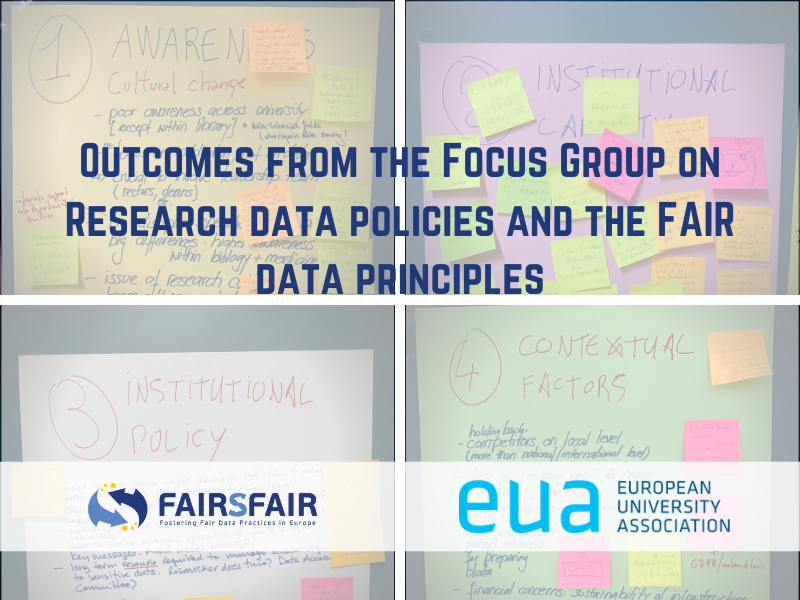
On 30 October 2019, FAIRsFAIR organised a focus group for universities on the topic Research data management and the FAIR principles. The workshop was led by FAIRsFAIR partner EUA, coordinator of FAIRsFAIR Work Package “FAIR Data Science and Professionalisation", and gathered 25 representatives from higher education institutes at Universidad Carlos III de Madrid (UC3M). Their aim: to share insights on the challenges associated with implementing FAIR principles
Following introductions from Eva Mendez (UC3M), Joy Davidson (DCC) and Lennart Stoy (EUA), the delegates were invited to discuss the following aspects of FAIR research data management:
- How to build awareness of the FAIR principles and research data management across researchers and university services
- How to design and implement research data management policies that support the uptake of the FAIR principles
- How to create the institutional capacity needed to implement such policies
- How external factors such as funders’ or publishers’ requirements affect the work of researchers and universities
The substance of the discussion is summarised below.
- ‘Mainstreaming’ research data management and the FAIR principles within large research organisations such as universities requires a collaborative and transparent approach from a variety of departments and services including libraries, research management, and IT, as well as the offices responsible for data protection, ethics, and research integrity. This is a challenge requiring both investment and the development of new workflows and tools.
- To support researchers, capacity building in the form of training and hiring is crucial. Alongside a centralised research data management service, there is a clear role for data stewards. However, attracting and retaining skilled staff for such roles is a problem, primarily due to a lack of clear career paths and hiring categories for this category of staff. For many universities, the additional staff costs associated with data stewardship are prohibitive, and funding staff through time-limited projects is not sustainable.
- Research data management and, by extension, FAIR data should be understood as a part of good scientific practice. In general, more work is needed to communicate this message to researchers and other stakeholders and to incentivise and reward appropriate behaviours. In some fields data sharing is already commonplace and such support is unnecessary.
- Universities are also under pressure from external sources. These include legal frameworks such as the recently agreed Open Data Directive, which may result in obligations for universities to make research data FAIR. Funders' requirements, such as Data Management Plans (DMPs), are another important driver of FAIR data – though it was also remarked that better monitoring and use of DMPs would be useful. Finally, publishers strongly influence data sharing and data management culture. This emerged from the findings of the The State of Open Data 2019 report.
Key Takeaways for FAIRsFAIR
There was strong consensus amongst those present that good practices – from university policies to researchers’ stories – can have a far-reaching effect in communicating the benefits of making data FAIR. It was agreed that FAIRsFAIR could play an important role in collecting, disseminating, and amplifying such good practices. It was also agreed that researchers in areas without a strong data sharing tradition will require particular support and that FAIRsFAIR is well placed to offer this support.
A second focus group will be held shortly in Amsterdam.The outcomes from the two focus groups will be integrated with survey feedback and incorporated in a landscape analysis report to be published in month 12 of the project.

